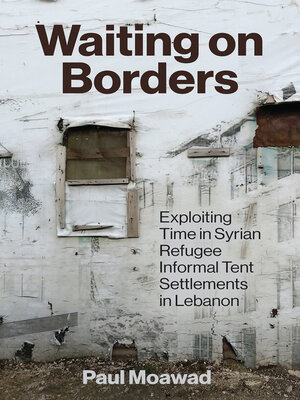Waiting on Borders
ebook ∣ Exploiting Time in Syrian Refugee Informal Tent Settlements in Lebanon · Refugees and Migrants within the Middle East
By Paul Moawad

Sign up to save your library
With an OverDrive account, you can save your favorite libraries for at-a-glance information about availability. Find out more about OverDrive accounts.
Find this title in Libby, the library reading app by OverDrive.



Search for a digital library with this title
Title found at these libraries:
| Library Name | Distance |
|---|---|
| Loading... |
A powerful contribution to ongoing debates on refugees, borders, and camps and the politics of waiting
The Lebanese–Syrian borderscape is predominantly porous and ambiguous, without an actual border control, and is incessantly contested. Repeated internal displacement and refugee crises have been a pervading political condition in Lebanon since the early twentieth century, but the most destabilizing refugee and displacement crisis stems from the regional influx into the country in 2011 of thousands of Syrian refugees.
In Waiting on Borders, Paul Moawad focuses on informal tented settlements (ITSs) inhabited by Syrian refugees on this border, to offer a compelling conceptualization of the politics of time and waiting, especially in relation to how temporal strategies are used as deterrence mechanisms in border regimes and informal spaces. Here, waiting is not just an active political instrument used by authorities to manage and control mobility, nor is it just a passive state refugees find themselves in. Waiting also becomes a tool of defiance, resilience, and self-governance. He further integrates rhythm analysis in his approach to understand the daily coping mechanisms that refugees develop with local actors, host-communities, and their own communities, to alleviate uncertainty and anxiety due to place detachment and home rupture.
Rooted in border studies and urban studies, and drawing on rich empirical cases, Waiting on Borders demonstrates how states weaponize time and waiting modalities—through prolonged uncertainty, bureaucratic delays, and forced stagnation—to discipline, control, and exclude refugees.







